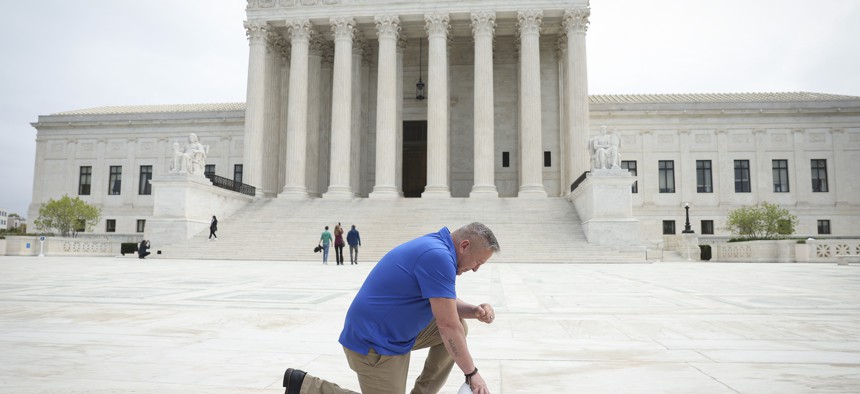Football Coach Had Right to Pray on School Field, Supreme Court Rules

Former Bremerton High School assistant football coach Joe Kennedy takes a knee in front of the U.S. Supreme Court after his legal case, Kennedy vs. Bremerton School District, was argued before the court on April 25, 2022 in Washington, D.C. Getty Images/Win McNamee
The legal dispute emerged at a public school in Washington state. Some experts say the court's decision could have significant implications for the role of religion in the public sphere and signify a further blurring of lines between church and state.
The U.S. Supreme Court ruled Monday that a high school football coach had a constitutional right to pray on the field after his team’s games.
The case, Kennedy vs. Bremerton School District, put the right of government employees—in this case, former football coach Joseph Kennedy—to express their faith against the constitutional ban against government-sanctioned religion.
By a vote of 6-3, the court sided with the coach.
“Respect for religious expressions is indispensable to life in a free and diverse republic—whether those expressions take place in a sanctuary or on a field, and whether they manifest through the spoken word or a bowed head,” Justice Neil Gorsuch wrote in the majority opinion.
Gorsuch cited the free exercise and free speech clauses of the First Amendment in his opinion, which was signed by five other justices.
In her dissent, Justice Sonia Sotomayor called the majority opinion “misguided” and predicted it would result in an erosion of rights. The ruling “sets us further down a perilous path in forcing States to entangle themselves with religion, with all of our rights hanging in the balance,’’ Sotomayor wrote in an opinion signed by two other justices.
In a friend of the court brief, the State and Local Legal Center argued that Kennedy’s conduct “crossed a line from private to official, and inextricably intertwined his personal beliefs with his public role as coach.”
The center, which is representing the National League of Cities, the U.S. Conference of Mayors and several other local government organizations, cited the establishment clause of the First Amendment, which bars government from making laws that establish religion.
“Governments have a responsibility to refrain from giving official approval to their employees’ religious expression, in order to avoid the appearance of favoring some religions over others (or religion over nonreligion) and to avoid placing coercive pressure on others to participate,’’ the center wrote in its brief. “Those concerns are especially acute for supervisors’ and leaders’ religious practices while on duty and in the workplace.”
'Reasoning Was Misguided'
Kennedy lost his job as a high school coach in Washington after school officials learned he had a practice of kneeling at midfield after games to offer a quiet prayer of thanks. Gorsuch noted that this occurred while others were checking email, chatting with friends or otherwise engaged in personal matters, and the students were otherwise occupied.
“Still, the Bremerton School District disciplined him anyway. It did so because it thought anything less could lead a reasonable observer to conclude (mistakenly) that it endorsed Mr. Kennedy’s religious beliefs,’’ Gorsuch wrote. “That reasoning was misguided. Both the Free Exercise and Free Speech Clauses of the First Amendment protect expressions like Mr. Kennedy’s."
Justice Samuel Alito, in his concurring opinion, portrayed the case as fairly narrow in scope.
Kennedy’s expression of faith “occurred while at work but during a time when a brief lull in his duties apparently gave him a few free moments to engage in private activities,’’ Alito wrote. “When he engaged in this expression, he acted in a purely private capacity. The court does not decide what standard applies to such expression under the free speech clause but holds only that retaliation for this expression cannot be justified based on any of the standards discussed.”
Some legal experts say the ruling could have significant implications for the role of religion in the public sphere and signify a further blurring of the lines between church and state.
“In Bremerton, the Supreme Court continued to smash away at the separation of church and state,’’ Micah Schwartzman, an expert on law and religion and the director of the Karsh Center for Law and Democracy at the University of Virginia School of Law, said in a statement.
“On its facts, this is a narrow decision, but the reasoning marks a consolidation in the conservative majority’s approach to the First Amendment and signals the end of an era of church-state separationism,’’ Schwartzman said.
Daniela Altimari is a reporter for Route Fifty.
NEXT STORY: State Courts From Oregon to Georgia Will Now Decide Who—If Anyone—Can Get an Abortion





